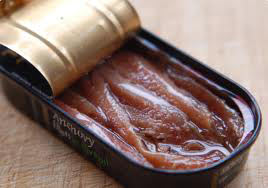Mrs. Johnstone’s Anchovy Sauce, including a nod to Mrs. Grigson & her hopes for the revival of melted butter.
The importance of the anchovy to the British kitchen during the long eighteenth century would be difficult to overstate. The pungent little fermented fish found itself into forcemeats and stuffings, roasted meats, soups and especially sauces, for fish, fowl, game, meat, poultry and vegetables.
By the time Christian Isobel Johnstone wrote her Cook and Housewife’s Manual under the pseudonym Meg Dods in 1823 its hegemony had begun to wane, in particular amidst the self appointed smarter set susceptible to the emergent if hardly effulgent cult of refinement in all matters culinary and more generally cultural. Johnstone herself acknowledges the trend in her seriocomical style while refusing to forsake the pleasures of so congenial an ingredient.

A diligent reader, but not the diligent student of Johnstone and her era, might wonder why so ordinarily precise a writer would instruct her reader pound her fish with butter before adding butter, or melted butter. The discerning student, however, would understand that in the words of Johnstone and her contemporaries “melted butter” is by no means what it would appear to the twenty first century reader.
It was the ubiquitous sauce of Britain for nearly two centuries, remarked upon and satirized (it was hard enough to make that it tended to oil and in diffident hands its quality could be poor) by travelers and commentators foreign and domestic. In capable hands however it was good--how else could it survive so long?--so good that in 1974 no less a wonder than Jane Grigson would hope “that melted butter, or English butter sauce, is in for a come-back,” highlighting its “light but rich texture.” (Grigson 352) Almost half a century on that lamentably enough has not happened, but hope springs.
To make melted butter, from Mrs. Grigson verbatim via Francatelli, although these days the butter need not be Danish:
“275 g (9 oz) unsalted or lightly salted Danish butter; Pepper, nutmeg; 30 g (1 oz) flour; Lemon juice, salt; 1 tablespoon double [heavy] cream (optional).
The first time you make this sauce, use a double boiler or bain-marie. This gives you greater control, though it does slow things down.
Melt one-third of the butter with pepper and nutmeg. Stir in the flour, then 150 ml (¼ pint) [5 oz] of cold water. Use a balloon whisk so that the sauce remains smooth. Heat until the sauce is at a simmering point. Leave for 20 minutes, then beat in the remaining butter in small pieces, using the whisk…. Correct the seasoning with a little lemon juice, salt and more pepper. Add the cream if you like.” (Grigson 352)
Then just stir the buttered anchovy into the melted butter by the proportion Mrs. Johnstone stipulates and courtesy of genius separated by a century and a half, you have some beguiling traditional anchovy sauce for use on just about anything savory.
Both melted butter and anchovy sauce may serve as bases for lots of other things. Mrs Johnstone’s observations on the base anchovy sauce:
“This is a sauce which ought to be piquant; the cook is therefore at liberty to make whatever additions she pleases;--cayenne, soy, essence of anchovy, lemon-pickle, horseradish, mustard, eschalot, nasturtiums, vinegars, in short, the whole circle of pungent and sharp flavours may be pressed into the service.”

And, for more depth than a white sauce:
“When a compound or double-relish sauce is wanted, we would recommend brown gravy-sauce, for the basis, instead of plain melted butter.” (Johnstone 248)
That, this time, on the subject of gravy, is straightforward enough in itself.
In addition to an anchovy sauce much like Mrs. Johnstone’s, Mrs. Grigson suggests a number of additional flavorings to enhance her basic melted butter with crab, lobster, shrimp or various herbs and, a refreshing addition, watercress. Fish stock could be substituted for the water when any of the shellfish maybe involved.

